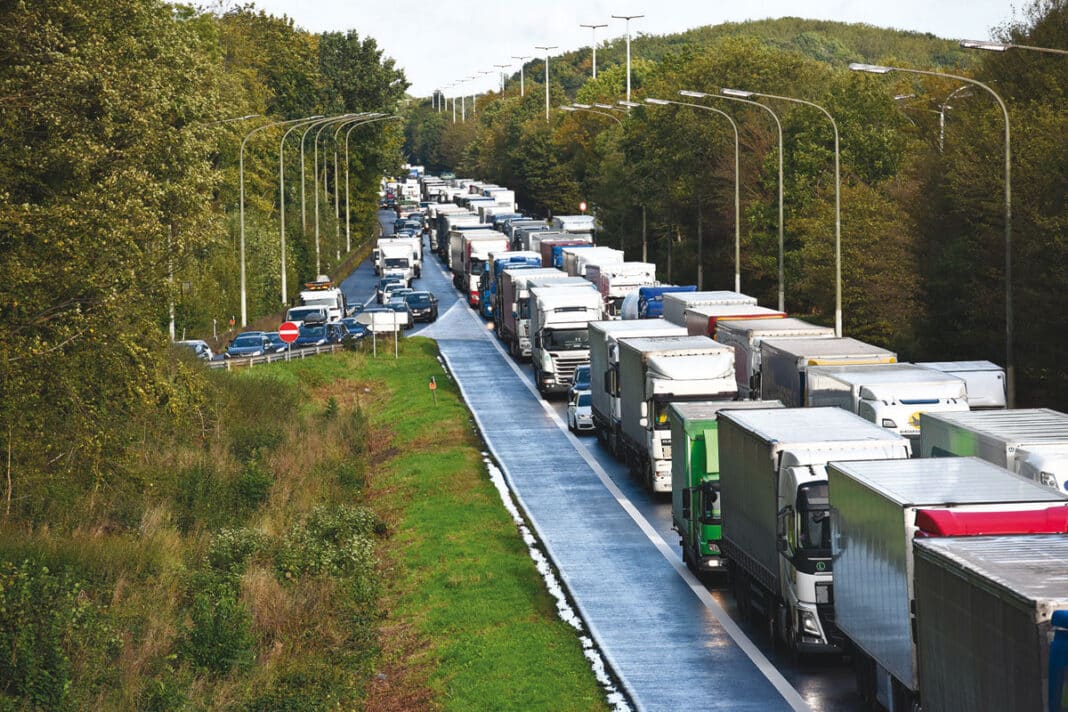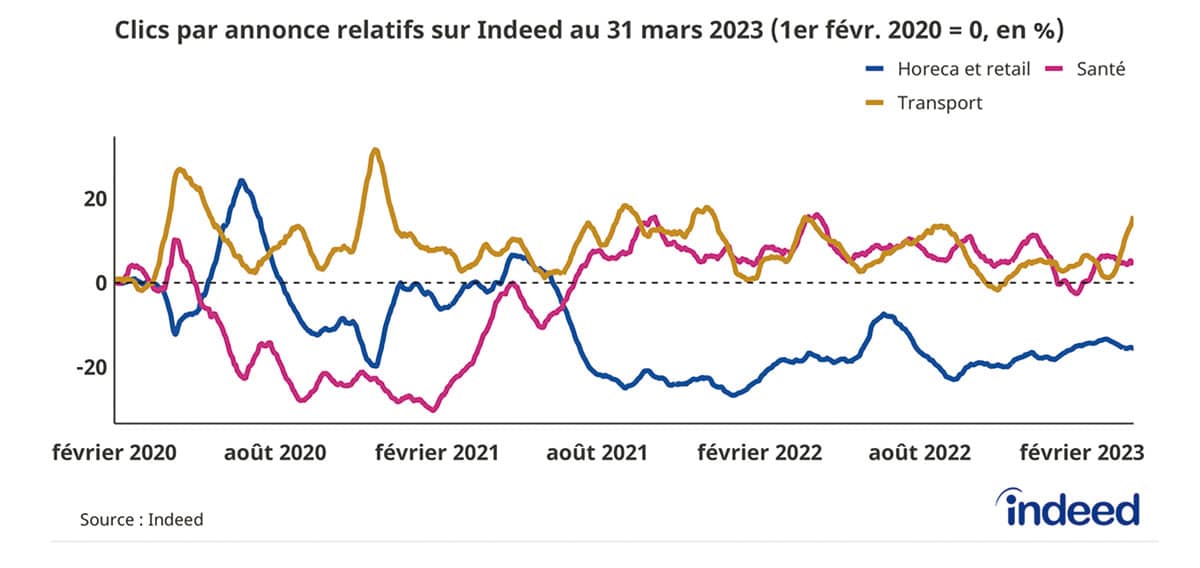Health sectors, you transport, of the hotel and catering industry, tourism and retail were among the most affected by the Covid pandemic. While the health situation currently seems stabilized, particularly significant recruitment difficulties remain in these sectors, in a context of a tense job market and a shortage of candidates or vocations. The latest Curious Industry study for Indeed allowed us to question professionals in these sectors, In France, in Germany, UK, in the United States and Canada, to better understand what was missing in their current work. Here are the main lessons for France.
Why this drop in attractiveness ? What do workers aspire to today?, especially in these sectors ? Hospitality and retail are the sectors where the attractiveness of job offers has fallen the most. The two graphs opposite come from Indeed France data on the sectors mentioned, and offer a comparative view of the volume of offers on Indeed between February 2020 and March 2023, as well as clicks per relative ad over this same period, which constitutes an indicator of the attractiveness of the offers for these sectors. It is in the hotel, restaurant and retail sectors that attractiveness is the most worrying, since it has continued to be lower than its pre-pandemic level since the summer of 2021, at the end of the third confinement in France. At the very moment when a strong economic recovery in the sector has begun, the candidates were no longer there, having seized the opportunity of confinements to reorient their career.
The final blow to medical vocations
In the transport sector, the curve of the volume of offers closely followed that of the hotel and catering industry in 2020, then exceeded its pre-pandemic level in mid-2021, growing continuously until the end of 2022. However, the curve of relative clicks per ad highlights an unstable attractiveness, serrated. The problem in health is different, since the sector did not experience any drop in activity – quite the contrary – during the health crisis. The pandemic has rather given the final blow to medical vocations, already in decline before 2020, by continuing to disrupt the organization of services and resources and making these professions even harder to live with than before. The supply-demand balance for employment in health and personal services is very alarming today, a progressive disaffection is also noted in the organizations which train for these professions.
Hotel and catering, tourism and retail : desertion at the first frustration
These sectors illustrate particularly well the new expectations and new behaviors of employees and job seekers, the famous tendencies to resign quickly in the event of dissatisfaction or disagreement with the employer. As a result of the lack of candidates, those who present themselves are particularly expected and necessary and therefore have greater latitude than before to express their expectations regarding the position. The turnover is the highest there (employees leave on average after a period of between six months and a year), and 30% expressed their wish to no longer work in these sectors. Overall low remuneration – 70% of respondents receive less than 30,000 euros per year – combined with very restrictive and tiring hours, contribute to making these professions “parentheses” rather than real careers. The study even explains that the threat of inflation or an economic recession does not seem to stop employees from abandoning their jobs., to which they are generally very little attached : 51% of professionals explain that their priority would be a higher salary and 35% would like better benefits.
Transport and logistics : harshness of interactions and search for short contracts
The aspirations of transport and logistics professionals have completely evolved with successive confinements, which allowed employees to spend much more time with their loved ones as well as in activities that fulfilled them. Many jobs in this sector require schedules and geographical distances that are difficult to reconcile with family life., and the confinements were real triggers on this subject for the workers. They are now demanding more structured schedules and seeking local missions as much as possible in order to benefit from personal time for their loved ones and their activities.. The lack of consideration or even respect of employers towards their employees was mentioned a lot by the French people surveyed, who also observe a complicated dialogue with their hierarchy, for example by experiencing refusals when they wish to telework even though their job is compatible with this mode of working. Employees are particularly emotionally disengaged, building one-off and “food” links with companies and above all seeking fixed-term missions.

70% of profiles wishing to change jobs are between 35 and 54 years old, ages normally less concerned by these aspirations.
40% consider that having more paid leave would encourage them to stay in their current job.
33% request training to enable them to progress in their career.
49% prioritize job offers that would offer them a better salary, significant argument when 59% of them earn less than €30,000 per year.
Health : loss of meaning and hope of working in acceptable conditions
The study report indicates that health workers expressed the most pessimism and despair in France.. The workload is at the limit of what is physically and psychologically acceptable, with wide and sometimes very restrictive schedules, have wiped out the passion that animated many professionals as well as the team spirit necessary in structures such as hospitals or nursing homes. The people interviewed reported a lot about the exodus of employees from the public sector to the private sector., to the detriment of many patients left abandoned.
HEALTH
40% of employees indicate that more flexible hours and working conditions more conducive to good health are what they are looking for first in a new mission.
22% cite the Covid pandemic as the main trigger for their desire to change jobs (the highest rate of the 5 countries in the study).
11% say that their current mission does not correspond to the job description on the basis of which they were recruited.
For 48% of these professionals, the most convincing argument to keep them in their jobs would be to offer them more paid leave















